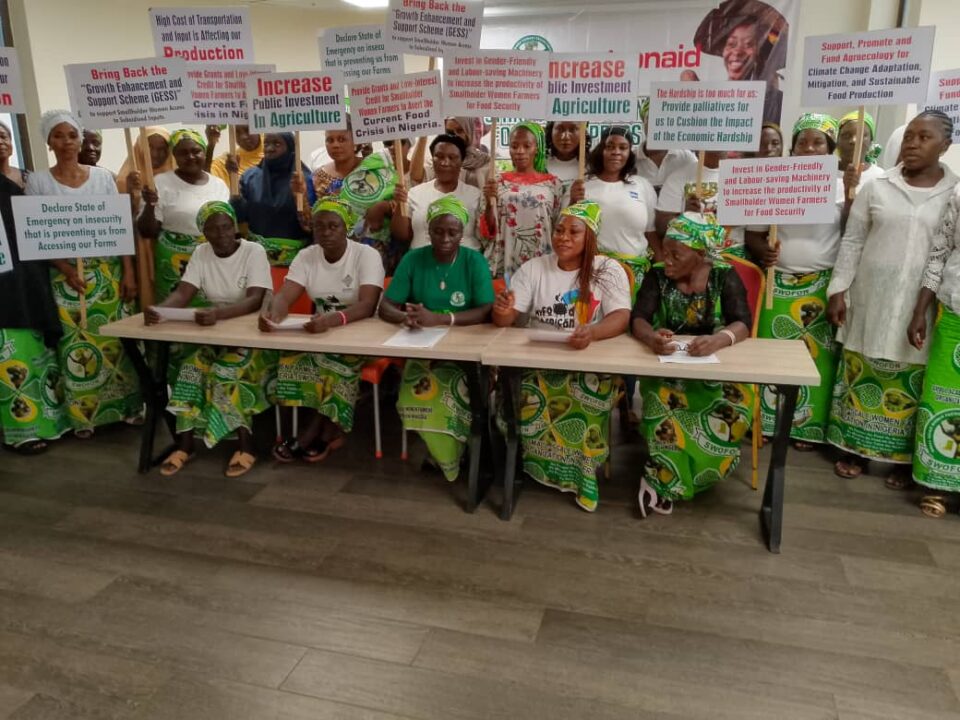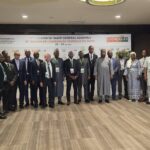By Felix Khanoba
The Small Scale Women Farmers Organization in Nigeria (SWOFON), a coalition of smallholder women farmer groups across the country, has attributed the rising hunger in many Nigerian households to the increasing prevalence of gender-based violence (GBV).
Addressing newsmen after a Stakeholders Consultative Forum in Abuja on Monday, organized with support from ActionAid, SWOFON lamented the adverse effects of GBV on farming activities and called for immediate, collective efforts to address the issue.
Olabisi Ogedengbe, Gwagwalada Coordinator of SWOFON, who spoke on behalf of the group, said several women farmers have been subjected to violent attacks in their farmlands while others have seen their crops destroyed by roaming livestock.
“Smallholder women farmers are the backbone of our agricultural economy, contributing significantly to food security, household income, and rural development. Yet, they face systemic challenges that impede their productivity and well-being. Among these challenges, GBV stands out as a pervasive and often overlooked obstacle,” she said.
Ogedengbe detailed the wide-ranging impact of GBV, from physical and psychological harm to disruption of farming activities. “Many women farmers experience physical violence, sexual harassment, and emotional abuse, often within their homes, communities, or workplaces. This leads to diminished mental health, reduced productivity, and, in severe cases, abandonment of farming altogether,” she added.
She further outlined the challenges GBV poses to women farmers: “Economic Disempowerment:
GBV limits women’s access to resources such as land, credit, and inputs. It restricts their ability to participate in training programs or access markets, further entrenching poverty and inequality.
” Loss of Agency and Leadership Opportunities:
Due to fear of stigma and retaliation, women often refrain from advocating for their rights or participating in community decision-making processes. This loss of voice hinders progress for themselves and their communities.
” Interruption of Farming Activities:
Violence disrupts planting and harvesting schedules and diverts resources away from productive uses to address the consequences of abuse, including medical costs and legal proceedings.”
Mercy Nanna, SWOFON Coordinator for Kuje Area Council, and Comfort Sunday, SWOFON’s Federal Capital Territory Coordinator, also spoke at the forum.
They emphasized the need for government intervention, including the enforcement of laws protecting women’s rights, equal access to agricultural resources, and addressing GBV in rural areas.
They further urged communities to foster awareness and dialogue to challenge harmful norms and practices that perpetuate violence against women.
The organization proposed several solutions which include : Empowerment Programmess: Providing women with education, leadership training, and access to support networks to build resilience and confidence.
“Strengthening Support Systems: Establishing accessible reporting mechanisms, legal aid, and psychosocial support services tailored to rural women.”
SWOFON, which represents over 500,000 women farmers across Nigeria’s 36 states, stressed the critical need to address GBV to achieve food security. “Tackling gender-based violence is not just a moral imperative; it is essential for achieving food security, economic growth, and sustainable development. By empowering smallholder women farmers and protecting them from GBV, we can unlock their full potential and build stronger, more resilient communities,” the group said.
They called on stakeholders—including government, civil society, the private sector, and individuals—to take part in combating GBV. “Together, we can create a future where women farmers thrive, free from fear and violence,” the statement concluded.
In a remark, the President of the League of Women Voters of Nigeria also decried the prevalence of sexual abuse on farms and cases of “sex for food” in internally displaced persons camps.
“This is a clarion call for women to speak against gender violence,” she said.



